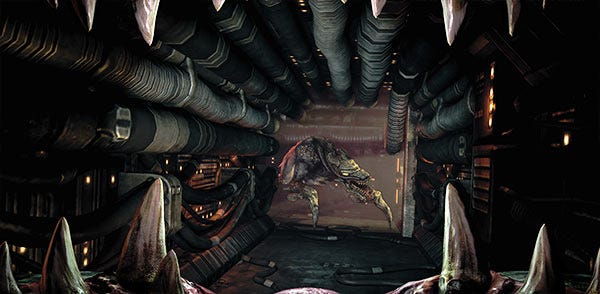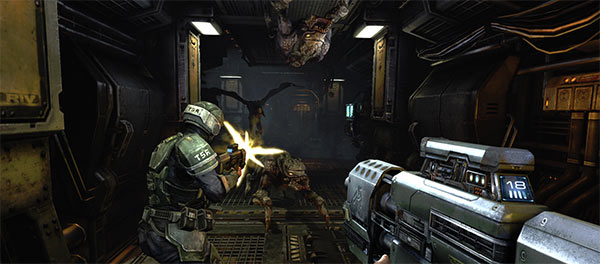The Making Of Natural Selection
Seven years ago to this very day, uber-Half-Life mod Natural Selection was released. Man! Aliens! Man vs aliens, in a real-time-strategy-in-an-FPS-perspective kinda way! In that time, it's become something of a landmark in terms of just how far you can stray from the source technology (pun not necessarily intended), just how successful a group of a have-a-go home designers can be, and quite how much prescribed concepts of first-person-shootage can be pushed. Developers Unknown Worlds Entertainment are gearing up for the insanely-anticipated release of the standalone sequel (of which the first and second super-shiny images of this post come from - click to embiggen), whose birth depends hugely on how much pre-order interest they can drum up. In other words, if you're excited about NS2, you should totally pre-order it. It's going to be a fine and splendid day in PC land when it finally walks our way.
Right now though, given it's NS1's anniversary day, we poked Unknown Worlds' Game Director Charlie Cleveland into providing a little insight into how this milestone mod came to be...
How did NS1 come about? Was it "we want to make specifically this game" or "we want to make an HL conversion?"
The game came first. The concept of playing a FPS or RTS while your buddies play the other and where each of your experiences enhances the other just seems so natural to me. I could never understand why other studios didn't make them (after making NS, I understood a bit better...there are a lot of tradeoffs). I love FPS games, but I always craved more depth and this seemed so obvious to me.
The only reason NS was written as a mod for Half-life is it seemed to be the most likely way to get this game concept in front of as many people as possible. Counter-strike was becoming huge so it seemed like a no-brainer. It had nothing to do with the engine's graphics or other capabilities, it was just the biggest platform.
Did you see it as a stepping stone to professional development, or was it more of a passion project?
It was a passion. I didn't have a financial plan, I just knew that I had to get this game out there. I knew I could never make money directly from NS because it was a mod but I was probably hoping that something good would come of it eventually. I knew it would be hard to launch a new game that was popular and profitable, so I only tried to make it popular. A lot of the work since then has been about making it profitable and sustainable.
How close was the eventual release to your hopes, dreams, wishes and wild, crazy fantasies?
Feature-wise, it wasn't very close to what I wanted. However, the spirit of the game and feelings I got when playing the game were right on target. It satisfied me and made me happy to have worked on it. I was surprised that even though the marine tech tree was about half of what I wanted, it seemed to provide enough depth for people to keep playing.
Was it an easy or difficult birth?
I have never worked so hard in my life, not before and not since. I literally did nothing but work on the game. I had no social life and I remember noticing many days at a time where I didn't leave my apartment. About the only time I would leave my room was to go to the bathroom.
I remember my little reward whenever we put out a new release was getting some Thai takeout down the street and then bringing it back to my room and spectating games while people played the new version. It wasn't very social but it was a huge thrill. Actually, looking back now I think a big part of the success of NS was due to my sublimated sex drive...
Was there a keen sense of something you were missing, not being a pro studio at the time, or was it easy to get hold of experts from the community to fill in any gaps?
I don't remember experiencing any "lack" in anything. Genres and games evolve so quickly that just building a game usually makes you an expert in that field.
My answer to everything was "take it over myself" or "work more". That worked great when your team is used to you being a bit of a control freak, but I've since learned to let go and trust other people to do stuff. That's a lot easier to accept when you are surrounded by people who are a lot better than you.
What was the tipping point when you realised it was a success - and how did it change things for you?
We had a big opening night. I think we had 2,000 simultaneous players on Halloween, 2002. I wasn't able to think about "success" at all though - I was too busy fixing bugs and freaking out thinking that people were going to leave as fast as they came. There were "lag" problems (actually a CPU issue that manifested as increased ping), balance problems and mass confusion. But it seemed to strike a chord with players so I kept at it.
Even since then, I've still never felt like we "made it". It's been a struggle and many many small steps and never any big markers of "success". We've done a lot of different things to stay alive and grow, including going into debt, making a casual game, doing contract work, etc. Recently things have really started to take off though and now we've got a nice office, revenue and a small but very talented team that enjoys working together. It's always a lot of work and it could still go away at any time, but you have to try to enjoy the journey.
What would you recommend to anyone else considering this kind of route into game development?
I always tell new game developers not to go to school but instead to use that money to build as many games as possible. After college, the first thing I did wasn't to go out and get a job but to rent a house with friends in Burlington, Vermont and spend the summer building a game. Some unnamed members of our "team" just drank iced coffee and played chess in those three months, but some of us worked very hard and produced almost nothing. The experience of that though was invaluable.
After we had nothing to show for our work, we started the project over again with a slightly different team. After that failed, just two of us decided to scrap our 3D espionage action game about feminism and religion and make a stupid Star Control clone with Play-Doh creatures in an aquarium. That game, we finished! It's been one foot in front of the other ever since.
Any sense of what makes a mod successful or unsuccessful?
One thing that helped us tremendously was releasing pieces of our game before the whole thing was released. This was in the form of a "technology release" which included some distinguishing features and tech in our game (Commander Mode, and a particle system tool which Half-life didn't have) along with all our level textures. What we had was interesting and high-quality enough that it got a lot of press attention on it. That helped make our launch much stronger but had an even better side effect – it attracted talent to us. Once we showed people what we were capable of (it has to be good!), we got mappers and artists of all kinds to help us build the rest of the game.
Also, you must listen to community feedback. What we learned is that you don't want to incorporate players' suggestions directly though – that would make the game incoherent and appeal less to people. But listening to the hidden frustration or problem behind the suggestion and then addressing it in the way you know that fits your game the best is key.
Finally, we learned to make memorable elements. Your releases don't have to be bug-free or perfect, but there must be elements that are top-notch and distinctive. For instance, NS in public play didn't always result in a fun game, but when Commanders and Marines worked together, the experience really shined and people were won over. I always heard from players how awesome the first Onos encounter was, especially when they realized that was a player. These moments seemed to burn the game permanently in their minds as unique and exciting. I've often thought that if a game had a half a dozen memorable experiences like that, your game is done.
Thanks, Charlie. So that's NS1 - but what of the rather splendid-looking NS2? Official words ahoy!
This Halloween marks the 7th Anniversary of the first public release of the original Natural Selection! To celebrate, please find below the first screenshots from Unknown Worlds' Natural Selection 2. Natural Selection was the most popular independent mod for Half-life and is now being re-made as a commercial sequel which will be released on Steam in 2010.
The second screenshot shows a squad of marines attacking some wall-running Skulks and a flying Lerk. The first shows the view from a Skulk with his trademark "bite-cam". Skulks use vent systems to ambush, attack and confuse unsuspecting marines.
Natural Selection 2 started life on the Source engine but is now running on our proprietary "Spark" engine. Spark allows small teams to make sophisticated games relatively quickly and without waiting. All changes to art, levels and even code are seen instantly in game.
We will be releasing the first piece of Spark (the level editor) in November to everyone that pre-orders NS2, so fans can start building levels. Unknown Worlds will be purchasing the best community levels to include in NS2. We release our other tools in the same manner before the game comes out as well.
Game information
Natural Selection 2 is a multiplayer-only first-person shooter game with real-time strategy elements. It pits marines versus aliens in shifting, strategic play in claustrophobic indoor sci-fi environments. The game is designed around four "pillars" - Real-time Strategy, Two Unique Sides, Dynamic Environments and Unlimited Replayability.It is now being offered for pre-sale and is being funded largely by fans.





